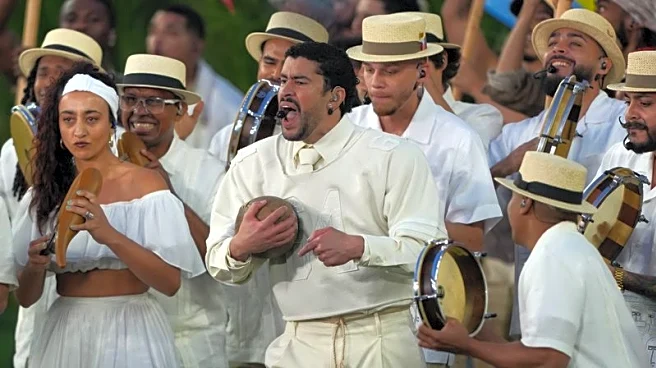What's Happening?
D'Angelo, the influential musician known for his role in shaping the neo-soul genre, has passed away at the age of 51 due to pancreatic cancer. Born Michael Eugene Archer, D'Angelo was celebrated for his unique
blend of R&B, funk, and soul, which drew comparisons to legends like Prince. His 1995 debut album, 'Brown Sugar,' and the critically acclaimed follow-up, 'Voodoo,' established him as a pivotal figure in modern music. Despite his success, D'Angelo struggled with the pressures of fame, leading to a decade-long hiatus. His work often explored themes of Black identity and spirituality, as seen in his final album, 'Black Messiah,' which addressed social issues and the Black experience in America.
Why It's Important?
D'Angelo's music transcended traditional genre boundaries, offering a profound commentary on Black culture and identity. His ability to blend spiritual and secular themes resonated deeply within the African American community, providing a voice for social and racial issues. His influence extended beyond music, impacting cultural discussions around race and identity. D'Angelo's legacy is significant as it highlights the power of music as a tool for social change and cultural expression. His work continues to inspire artists and activists, emphasizing the importance of addressing societal issues through art.
What's Next?
The music industry and fans are likely to reflect on D'Angelo's contributions and the void his passing leaves. Tributes and retrospectives may explore his impact on neo-soul and his role in addressing racial and social issues through music. Future artists may draw inspiration from his approach to blending genres and addressing complex themes, potentially leading to a resurgence of interest in his work and the messages he conveyed.
Beyond the Headlines
D'Angelo's career highlights the challenges artists face in balancing personal expression with public expectations. His retreat from the spotlight underscores the pressures of fame and the impact of objectification on artists. His story also reflects broader cultural dynamics, such as the commodification of Black culture and the struggle for authentic representation. D'Angelo's legacy serves as a reminder of the enduring power of music to challenge societal norms and inspire change.











